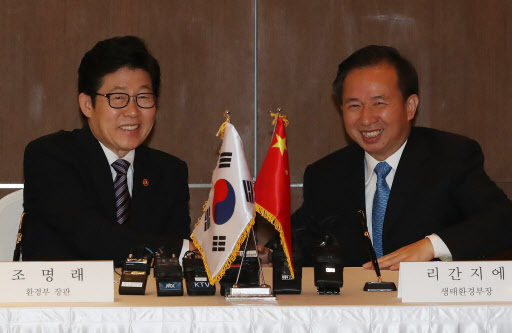Korea, China sign ‘clear sky’ plan to fight fine dust
By Ock Hyun-juPublished : Nov. 4, 2019 - 18:27
South Korea’s environment minister and his Chinese counterpart vowed close cooperation to combat air pollution at their first annual ministerial talks in Seoul on Monday amid public concerns over toxic particles blowing in from China.

Minister Cho Myung-rae and Chinese Environment Minister Li Ganjie signed a “clear sky” action plan that includes joint implementation of policies, joint research, and exchanges of technology and personnel between the two countries to fight the particulate pollution.
The high-level policy meeting was held for the first time. In February, the environment ministers of the two nations agreed to meet annually.
“I have delivered to Li the Korean people’s concerns about fine dust that comes from China,” Cho said at a press briefing. “I asked for close cooperation from China in sharing information about fine dust and strengthening joint efforts reduce it.”
Under the “clear sky” plan, Seoul and Bejing will cooperate to advance technologies to prevent pollution and will conduct research to determine the sources of air pollution affecting both countries. They will also closely share information on air pollution forecasts and work to improve the system.
The South Korea-China Environmental Cooperation Center, which opened in Beijing in June, will be in charge of implementing the plan.
In March, South Korea designated fine dust as a social disaster amid growing concerns over the particulate pollution blanketing the Korean Peninsula more frequently and intensively in recent years.
The level of particulate pollution gets higher from autumn through spring as wind blows from west to east. Pollutants traveling from China as well as domestic emissions from old diesel cars and coal-fired power plants are believed to be major contributors.
Last week, the government’s 2020-2024 fine dust management plan was approved under which it aims to reduce the level of PM2.5 -- ultrafine airborne particles smaller than 2.5 micrometers in diameter -- by 35 percent by 2024 compared with 2016 by investing 20 trillion won ($17.24 billion). If these goals are achieved, the level of PM2.5 will remain at around 16 micrograms per cubic meter.
Chaired by former UN Secretary-General Ban Ki-moon, the National Council on Climate and Air Quality was also launched. It suggested a seasonal dust management system under which a crackdown on illegal emissions would be toughened and up to 27 coal power plants shut down in spring.
“We are victims of air pollution and climate change, but we should not forget that we are also perpetrators,” Ban said in his opening speech.
(laeticia.ock@heraldcorp.com)
-
Articles by Ock Hyun-ju







![[Graphic News] More Koreans say they plan long-distance trips this year](http://res.heraldm.com/phpwas/restmb_idxmake.php?idx=644&simg=/content/image/2024/04/17/20240417050828_0.gif&u=)
![[KH Explains] Hyundai's full hybrid edge to pay off amid slow transition to pure EVs](http://res.heraldm.com/phpwas/restmb_idxmake.php?idx=644&simg=/content/image/2024/04/18/20240418050645_0.jpg&u=20240419100350)






![[From the Scene] Monks, Buddhists hail return of remains of Buddhas](http://res.heraldm.com/phpwas/restmb_idxmake.php?idx=652&simg=/content/image/2024/04/19/20240419050617_0.jpg&u=20240419175937)

![[KH Explains] Hyundai's full hybrid edge to pay off amid slow transition to pure EVs](http://res.heraldm.com/phpwas/restmb_idxmake.php?idx=652&simg=/content/image/2024/04/18/20240418050645_0.jpg&u=20240419100350)

![[Today’s K-pop] Illit drops debut single remix](http://res.heraldm.com/phpwas/restmb_idxmake.php?idx=642&simg=/content/image/2024/04/19/20240419050612_0.jpg&u=)